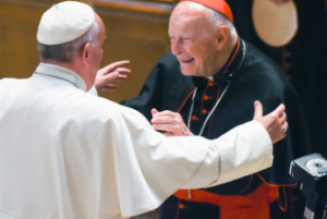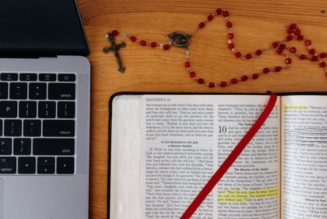Michael Hickson, husband to Melissa and father of five children, died at age 46 on Thursday, June 11 at St. David’s South Austin Medical Center after the hospital withheld treatment from him, including hydration and nutrition, for six days.
His wife was not notified of his death until the next morning after his remains had already been transported to a funeral home without her permission.
Mr. Hickson became a quadriplegic in 2017 after a sudden cardiac arrest incident while driving his wife to work one morning. He had been in and out of hospitals, rehabilitation facilities, and home for the last three years.
“He regained his personality, had memories of past events, loved to do math calculations, and answer trivia questions,” Mrs. Hickson said of her husband in an interview with The Texan.
“Why are disabled people considered to have a poor quality of life?” Mrs. Hickson asked.
Brush Country, the skilled nursing facility in Austin where Mr. Hickson was living since March, sent an email on May 10 saying that one person had tested positive for COVID-19 and that they’d be testing all of the patients in the facility.
On May 15, Mrs. Hickson received an email that Mr. Hickson had tested positive for COVID-19 but was asymptomatic. On May 25, she was told he was retested and was negative.
On June 2, seemingly out of nowhere, Mrs. Hickson was notified that Mr. Hickson was being taken to the hospital, St. David’s South Austin because he had a temperature and trouble breathing.
On June 3, he was admitted to the Intensive Care Unit (ICU). On Friday, June 5, Mrs. Hickson was told Mr. Hickson was not doing well and that she should go to the hospital to visit him. When she arrived, they wouldn’t let her enter his room, but allowed her to FaceTime with him from the hallway.
He was still responsive, puckering his lips when she said “Can I get a kiss?” and answering that he would like her to pray with him, Mrs. Hickson said.
Then on Saturday, she was told by the hospital that he was moved out of the ICU, was stable and breathing on his own, and that hospice care would be calling her. Mrs. Hickson was shaken and shocked, wondering why he would need to go on hospice care if he was stable and recovering.
When she spoke to the hospice representative, she was assured that he could still receive resuscitation and fluids and nutrition through his percutaneous endoscopic gastrostomy (PEG) tube.
However, the hospital nurse with whom Mrs. Hickson spoke contradicted that. She said that Mr. Hickson would not be receiving nutrition or hydration and that he would not be resuscitated.
In a recorded conversation, the attending physician told Mrs. Hickson that he didn’t think her husband had much quality of life and, against her wishes, Mr. Hickson would not be nourished, hydrated, or receive treatment for the pneumonia he had developed.
“So as of right now, his quality of life — he doesn’t have much of one,” the doctor said.
“What do you mean? Because he’s paralyzed with a brain injury, he doesn’t have quality of life?” she responded.
“Correct,” the doctor replied.
On Saturday, when Mrs. Hickson returned to the hospital, the nurse supervisor took her to Mr. Hickson’s room. “It was at the end of the hall, empty and dark with no machines at all for treating him.”
Mrs. Hickson was unable to speak to her husband again after Saturday. She requested FaceTime visits with him while trying frantically to work on the guardianship issue and get him care. On the morning of his death, she sent an email asking for an update on his condition.
On Friday morning, the hospice group called her to tell her Mr. Hickson had died Thursday evening and asked if she’d like the name of the funeral home where his body had been taken.
“No one has offered condolences. There has never been an apology or acknowledgment of his death. It’s like they just don’t care,” she said.
A spokesperson for St. David’s South Austin Medical Center provided the following statement to The Texan, “The loss of life is tragic under any circumstances. In Mr. Hickson’s situation, his court-appointed guardian (who was granted decision-making authority in place of his spouse) made the decision in collaboration with the medical team to discontinue invasive care. This is always a difficult decision for all involved. We extend our deepest sympathies to Mr. Hickson’s family and loved ones and to all who are grieving his loss.”
“This is not isolated,” Kimberlyn Schwartz, Texas Right to Life’s Director of Media and Communication, told The Texan. “Quality of life is a value judgment and is a decision that should be left to the family. This horrible ‘quality of life’ ethic is ingrained in many of our large medical institutions and patients and families need to be vigilant.”
Schwartz said that in 2015, the Texas Legislature passed House Bill 3074 which prevents doctors from withholding artificially administered hydration and nutrition except if the patient has an advanced directive indicating so or the family has indicated that it is their wish for the patient based on the circumstances.
Mrs. Hickson had been appointed Mr. Hickson’s temporary guardian to make decisions for his care, but while her case was pending in probate court, Mr. Hickson’s sister, Renee Hickson, also filed for guardianship rights over him at the request of a probate court investigator for Travis County while he was residing at an acute care facility in Luling.
Mrs. Hickson is convinced that the Luling facility worked against her because, due to an error in filing insurance claims, the facility was not receiving the payments and a bill of $90,000 had accrued.
In February, when Mr. Hickson was moved for seizure-like symptoms to a hospital in Kyle, Probate Court Judge Guy Herman appointed Family Eldercare, a non-profit group serving the elderly in Central Texas, as the temporary guardian until a hearing could be held to determine his permanent guardian.
After initially consulting with his wife and receiving her wishes that he be placed in a brain and spinal cord injury program, Family Eldercare moved him in March to Brush Country, a skilled nursing facility in Austin, and said they’d continue looking for a rehabilitation facility for him.
While at Brush Country, Mr. Hickson contracted COVID-19.
Family Eldercare agreed to the doctor’s decisions to withhold treatment, nutrition, and hydration from Mr. Hickson during his stay at St. David’s South Austin.
Mrs. Hickson has been unable to make a decision about a memorial service or cremating his remains as she is still seeking counsel about legal recourse she might have for his death.
She said she is only making it by the strength God has given her. “I know where he is and that’s the only thing that gives me consolation is that he is with Jesus,” she said.
Her children are extremely angry at the doctor for his decision not to treat their father and at their aunt who agreed with the doctor’s orders.
“I really want everyone involved to be held accountable. I want to shine a light on this. They took his only voice for his care when they silenced me. Family Eldercare was supposed to keep him safe and they didn’t.”
On June 30, Family Eldercare posted a statement about Mr. Hickson’s death on its website. The statement expressed condolences to those who loved and cared for Mr. Hickson, and said, “As Guardian, and in consultation with Mr. Hickson’s family and medical providers, we agreed to the recommendation for hospice care so that Mr. Hickson could receive end-of-life comfort, nutrition and medications, in a caring environment.”
UPDATE: The story has been updated to include a statement from a spokesperson for St. David’s South Austin Medical Center, and a statement released by Family Eldercare after publication.
Disclosure: Unlike almost every other media outlet, The Texan is not beholden to any special interests, does not apply for any type of state or federal funding, and relies exclusively on its readers for financial support. If you’d like to become one of the people we’re financially accountable to, click here to subscribe.






![Please don’t give up on in-person teaching, Notre Dame [paywall]…](https://salvationprosperity.net/wp-content/uploads/2020/08/please-dont-give-up-on-in-person-teaching-notre-dame-paywall-327x219.jpg)



